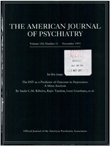Diagnosing dissociative disorders in The Netherlands: a pilot study with the Structured Clinical Interview for DSM-III-R Dissociative Disorders
Abstract
OBJECTIVE: To improve the ability to diagnose dissociative disorders in The Netherlands, the authors conducted a study using a Dutch version of the Structured Clinical Interview for DSM-III-R Dissociative Disorders (SCID-D) with additional questions on childhood trauma and symptoms of borderline and histrionic personality disorders. METHOD: All interviews were audiotaped or videotaped and rated by two investigators separately. Forty-four patients (42 women and two men) participated in the study. Most of the patients had been referred for evaluation of dissociative symptoms; five had participated in a nationwide survey on incest. None of the patients had ever received a diagnosis of a dissociative disorder, and none had evidence of organic brain syndrome or mental retardation. All patients were in active treatment; 23 were being treated in an outpatient psychiatric service, 13 in an inpatient psychiatric service, and eight in private practice. Thirty-two patients had been psychiatric inpatients at least once. RESULTS: Four diagnostic groups of patients were identified: two with dissociative disorders (12 patients with multiple personality disorder and 11 with dissociative disorder not otherwise specified), one with DSM-III-R personality disorders (11 patients), and one without dissociative or personality disorders (10 patients). CONCLUSIONS: Dissociative disorders are clearly not only an American phenomenon. The diagnosis can be made outside of the United States if the symptoms are sought. The SCID-D proved to be a promising instrument.
Access content
To read the fulltext, please use one of the options below to sign in or purchase access.- Personal login
- Institutional Login
- Sign in via OpenAthens
- Register for access
-
Please login/register if you wish to pair your device and check access availability.
Not a subscriber?
PsychiatryOnline subscription options offer access to the DSM-5 library, books, journals, CME, and patient resources. This all-in-one virtual library provides psychiatrists and mental health professionals with key resources for diagnosis, treatment, research, and professional development.
Need more help? PsychiatryOnline Customer Service may be reached by emailing [email protected] or by calling 800-368-5777 (in the U.S.) or 703-907-7322 (outside the U.S.).



